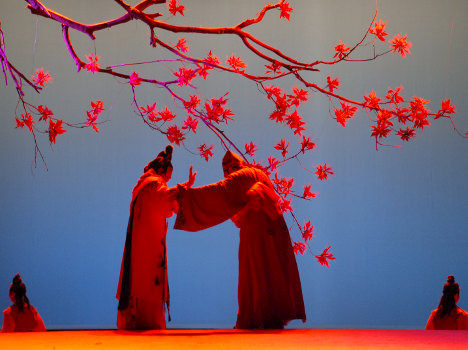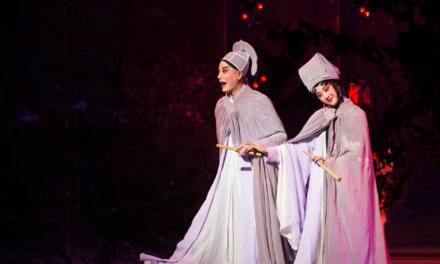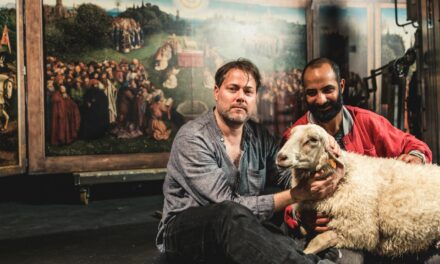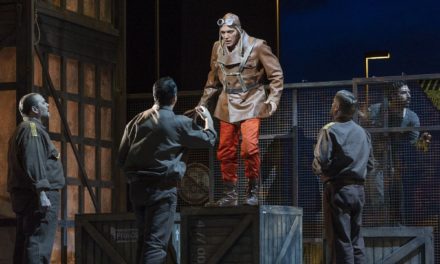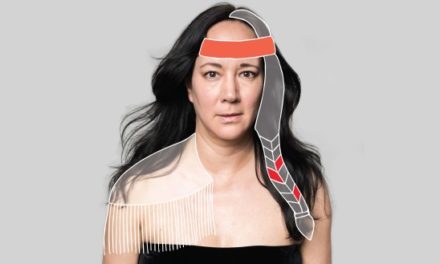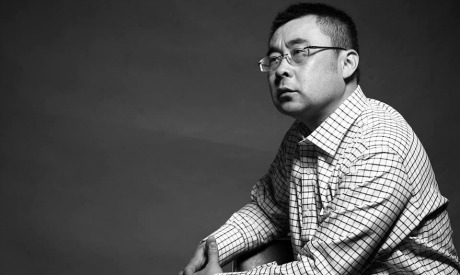
Professor Lu Ang, dean of directing department at Shanghai Theatre Academy, and Vice Chairman of Shanghai Theatre Association. (Photo: Courtesy of Cairo International Festival for Contemporary and Experimental Theatre)
Lu Ang is a theatre director, playwright, professor and the dean of the directing department at Shanghai Theatre Academy.
In its 23rd edition, the Cairo International Festival for Contemporary and Experimental Theatre honoured several renowned international theatre practitioners, among them Professor Lu Ang, dean of the directing department at Shanghai Theatre Academy, and vice chairman of the Shanghai Theatre Association.
Lu Ang is known for creating theatrical bridges between the past and present, East and West. He has directed 70 theatre productions, most of them based on traditional Chinese operas, has published many theoretical books on directing and has won multiple awards.
Ahram Online spoke to Professor Lu Ang recently about the connection between tradition and modernity, links between Chinese and Egyptian theatre, and his creative experience as a whole.
Ahram Online (AO): One of your major achievements is that you were able to create a link between traditional Chinese theatre and modern Western theatre. Why do you think it important to link both?
Lu Ang (LA): I’ve been working a lot around this topic and you will find its reflection in my theatre and academic work.
The idea of creating a connection between both theatres goes back to 1935 when Mei Lanfang, one of the most famous Peking opera artists, was performing in Moscow. There, Lanfang met four of the most important Western theatre directors of the time: Russians Konstantin Stanislavski, Vladimir Nemirovich Danchenko and Vsevolod Meyerhold and the German Bertolt Brecht.
They were impressed with Lanfang’s performance and thought about developing a creative link between the two theatres, namely traditional Chinese opera and Western modern theatre.
Every kind of drama stands for the culture of its country. There are many theatres around the world reflecting the experiences of each society. If you wish to have a rich, diverse and colourful theatre, you also need to be open to a variety of theatres. and know how to bring them together.
That is also why visiting Egypt is very important to me. I’m getting to know your theatre and listen to your music. I’m getting to know your culture.
Life is very short and human beings have this desire of exploring “other planets,” and this is why we always need to find a connection between people of every planet.
AO: How popular is this theatrical fusion in China?
LA: The history of modern Western drama in China is only a hundred years old, while Chinese traditional theatre has existed for over one millennium.
Most of the young generation residing in the cities is very receptive to modern drama, but 80 percent of Chinese people who live in the rural areas prefer traditional Chinese opera.
In villages, the older generation finds in traditional theatre an educative element, as it brings to them stories from history. They also use traditional opera in their celebrations and weddings.
The younger generation is not attracted to traditional Chinese forms of theatre, and this can create a problem. This art form might vanish, just as happened in the case of old traditional Greek and Indian theatres. It is a pity for a nation to forget about its traditions and cultural history.
AO: So by fusing modern and old, you try to keep those these traditions alive? How do you do this?
LA: Our government is working hard to preserve and to promote Chinese traditional theatre. That is why I believe when I am honoured in Egypt, the honour goes to traditional Chinese theatre.
Throughout the years of my theatrical practice, I noticed that traditional Chinese theatre is like an antique that is covered with ash and dust. Yet, the more you know about it the more valuable it becomes to you.
What I am trying to do is to carefully remove the dust from our traditional culture, and place it on a modern stage so the audience can capture its original beauty.
However, I do not use traditional art in a modern performance, rather I am working on removing some really old elements and I then re-introduce the best of the tradition to the audience.
One of the plays I directed was based on an over 800-years-old Chinese opera tradition. It toured the world and was well received.
AO: You are a theatre director, playwright, professor, and dean of the directing department at Shanghai Theatre Academy. Which position do you cherish the most?
LA: First and foremost, I am a professor. And I direct in my leisure time. I believe that teaching, directing, and writing books all feed into each other. All three serve my main mission, which is the fusion between Eastern and Western theatre.
AO: How do you assess the current theatre scene in China?
LA: Theatre is facing a global problem. Traditional art forms are being affected by modern art forms. For example, radio was negatively affected by television and cinema, and now they are all being affected by the internet. But theatre has a great value that most of other art forms lack, which is people to people communication.
Globally, theatre is losing the younger generation and we have to work out a solution together. This is why it is important that the Cairo International Festival for Contemporary and Experimental Theatre is back because it is an opportunity for people to come together and exchange ideas rather than just communicate online.
I have a great interest in Egyptian theatre and I wish to direct an Egyptian theatrical production upon my return to China, or to invite Egyptian directors to China where they can embark on some theatrical partnerships. We can also introduce Egyptian classics to our Chinese traditional theatre. This can be the beginning of an interaction between both theatres.
AO: And how would you assess freedom of expression in the Chinese theatrical scene today?
LA: There is no absolute freedom in any country, and absolute freedom is not necessarily a good thing.
In my opinion, theatre is like religion; it seeks to revive the good nature of human beings. We make theatre because we want to reach this target. We are free, but this kind of freedom is not absolute. For example, I would never make a play promoting drug use as a way to respond to one’s desires.
AO: Is there any censorship placed on theatre productions in China?
LA: I believe that theatre productions that tackle social problems should be allowed by the authorities, provided the problem that they tackle really exists and that it is being presented for good purposes.
AO: What about the state’s financial support for theatre?
LA: In China, the government places a strong emphasis on art, and the development of our economy in the past years has helped us realise the importance of culture. For example, we now have the National Art Foundation to support artists.
AO: What advice do you usually give your theatre students in the Academy?
LA: To open up to the world and to become familiar with the different theatres of the world. I advise them to travel the globe and witness other realities. I also encourage them to attend different International theatre festivals, because they are good opportunities to gain experience.
AO: How did you find the Chinese performance Thunder Storm, which opened this year’s Cairo International Festival for Contemporary and Experimental Theatre?
LA: I liked it. The director, Chen Dalian, is my student and I enjoy his work because he borrows many methods from traditional Chinese theatre, including the use of space and the drums we saw in Thunder Storm. But I would suggest he shortens the performance to be one hour and 90 minutes, instead of two hours.
AO: What are your thoughts on this year’s edition of the festival?
LA: Though I am visiting Egypt for the first time in my life, in China we are well aware of this festival, as China participated in this event on several occasions.
I am very happy to be honoured and in fact, I see that this recognition is not for me only, but for Chinese theatre in general.
Chinese theatre has a very long history of over a thousand years and it is great to receive such an honour from a country that also has a long history and culture. Also, the festival comes in conjunction with year 2016 being marked by celebrations of Chinese-Egyptian cultural connections.
AO: How do you evaluate the cultural cooperation between Egypt and China, and particularly in the theatre sector?
LA: I believe we need to create more and more channels for cultural exchange. Participation in the 23rd Cairo International Festival for Contemporary and Experimental Theatre gave me an opportunity to know more about Egyptian theatre.
I watched some of the Egyptian plays during the festival and I appreciated many performances and liked the way the audience interacts with theatre here.
In the Shanghai Theatre Academy, we have an international master class programme that welcomes scholars from around the world. In past years, we hosted theatre people from the US and European countries. I think we need to expand and introduce participants from the Mediterranean region. We also need to explore more the theatre from Turkey, Iran, as well as Egypt. These are the most important countries in the region. I would also like to invite Egyptian theatre directors to take part in this master class.
This article was originally published on Ahram.org. Reposted with permission. Read the original article.
This post was written by the author in their personal capacity.The opinions expressed in this article are the author’s own and do not reflect the view of The Theatre Times, their staff or collaborators.
This post was written by Nahed Nasr.
The views expressed here belong to the author and do not necessarily reflect our views and opinions.

